Any gardener or gardener is aware of the fact that not all types of insects are friendly to humans. Some pests, such as ants, should be eliminated immediately. Experts advise to always approach solving the problem comprehensively, since there is no universal method. From this material you can find out what types of insects live in the garden bed, how to get rid of them using folk remedies, and what are the vital functions of insects in the garden. fruit trees and bushes.
Cover the holes and draw them. If you are unsure, place poison or traps near windowsills, doors and electrical outlets. This is all general areas through which ants enter and exit the house. It is best to follow all the previous steps in the letter.
Ants are difficult to eliminate without a global plan. If none of the steps above work, you may need to hire a professional. A good pest control agency will return home at least three times. A professional will stop by to see if he can find the nest. The second visit is to get rid of the ants. A professional will likely make a third visit to ensure it is free of all ants.
On personal plot There are many species of both beneficial and harmful insects. Although ants are forest orderlies and bring certain benefits to the garden - they loosen the soil, allowing it to receive oxygen and some useful substances, and destroy some pests. But at the same time, they contribute to the spread of aphids, protecting them from pests, transferring them to new crops and feeding on their sweet milk, and harm the roots of crops, which are damaged as a result of the creation of many kilometers of underground passages.
Boric acid is considered harmless to people and pets, but should be kept out of the reach of children. Blacksmith ant bite. It's more annoying than painful, but keep it in mind. Ants can become unwelcome guests when they trade our home for conquered land. Let's see what are the tricks, natural remedies to counteract this problem and try to solve it effectively and for a long time.
How to Eliminate Ants: Solve the Root
There are several methods, even natural ones, to eliminate ants, but they won't hurt the problem from recurring. Therefore, you first need to understand what is the element that attracts the ants and then try to remove that review and block the ants at the source.
Often, black and red ants, also known as pharaoh ants, settle in our areas. Black ones are also called garden ones. They do not build an anthill, which is sharply different from their forest relatives, living in a small depression in the ground, on top of which rises a characteristic hill.
Their home is sometimes located in the roots of trees and bushes. They feed on the secretions of aphids, creating a successful symbiosis with them. It spoils plants, and the goosebumps provide it with a comfortable existence and protection from ladybugs and other lovers of aphids. Because of its invasion, cultures can even die. Therefore, the fight against ants must begin with removing aphids.
Crumbs, drops of honey, jar pots, open pots, the first rule to keep ants is always keep seals and containers, especially those containing sugar, which are very good for ants. Therefore, maximum attention to cleaning, no stains or crumbs, and any food items should be placed in the refrigerator or shelves inside special containers to avoid possible ant recall. We also avoid leaving dirty dishes or dishes out for a long time.
How to get rid of garden ants
The first way to keep ants out is to identify possible access points, such as cracks in doors and windows, and try to block them with plaster or silicone. Then we can sprinkle vinegar, lavender oil, talcum powder, coffee grounds, pepper or lemon juice, these products give off an odor to ants. We can create a mixture of white vinegar and water or lemon and water to be used on sinks and high-risk surfaces to periodically renew our natural anti-trust barrier.
It is also difficult to compete with ants in the garden if they are red. They quickly restore the size of the colony, get used to the pesticides used, and choose root systems crops In just a few years, insects of this species can destroy a tree. If the nest is simply in the garden, and not in the roots, then nothing will grow near this place. There is a version that red insects can even milk aphids. If possible, it is recommended to use folk remedies for ants in the garden so as not to harm beneficial insects and plants.
Alternatively, there is a special spray on the market that is an excellent solution for permanently eliminating ants. Immediate action: simply spray the product on the area affected by the presence of insects and you will immediately solve the problem in a short time. In addition, thanks to the special formula of pyrethrum, this product is able to create a real active barrier against all insects that crawl.
If ants in the house are a nuisance, in the garden they are right to be allowed to live freely, their presence can be useful in providing some cleanup of dead crumbs and insects. Let's make sure they stay in their natural environment. Is there a natural insecticide to keep ants away? Like every year, already in the first days of March there is a problem of ants that, Silesia, enter our homes with serious consequences: dispensations captured by these animals and all the food that needs to be thrown away!
Video “How to defeat ants in the garden”
This video presents the most effective methods of combating these insects.
Traditional methods of insect control
How to get rid of annoying ants using popular methods?
Natural insecticide for ants
Not to mention their persistence in building nests and small galleries in the most unusual places: holes in the wall, under tiles, in furniture and in the windows of the house. How to solve this problem by following environment? Before using harsh and polluting products such as ant killers, try using these natural remedies, which are often just as effective as the environment in removing ants naturally.
First of all, if you have a problem with ants in your home, avoid anything that might attract you: seal all food packages, remove crumbs immediately after eating, and do not leave dishes in the sink. Ants have a smell of smell, and they can smell food from just a few meters away.
They use natural repellents, the smell of which is unpleasant to insects - tansy, parsley, laurel, mustard, anise, tomato tops. You can place leaves and stems of plants near passages, trees, along the fence to scare away pests from the beds. Insects are intolerant to the smell of mint and valerian, so they are often planted along plantings of main crops.
Coffee for Ants: As suggested, coffee is an excellent natural remedy for keeping ants out of the pantry. Just put half a cup of powdered coffee in the pantry and the strong smell will keep ants wide open from your pantry.
Vinegar Ant Repellent: Vinegar is also an excellent natural insecticide that can help you get rid of ants from your home and discourage infiltration. Prepare the mixture and use it to clean your sink and floors. The smell of vinegar is a great rebuff against ants! To discourage ants from entering your home, sprinkle this spray at entry points or in and out of doors. This should be enough to keep them within a wide range.
You can sprinkle soda on ant heaps. Or spread ash or lime near the nests and fill the anthills with them.

To combat ants, they also use a mixture composed of aromatic herbs oregano and sulfur in a 1:2 ratio. It’s even possible to dig up the entire garden with it.
Boric Acid: Even the one we already mentioned is a valid natural insecticide against ants. Boric acid has the same effect as a poison for this insect, and can be useful in the most desperate cases to eliminate ants from a house by spreading them to the entrance of nests.
How to Avoid Ants and Find Nests
In addition to using natural insecticides to remove ants, it is good to prevent nests from forming and, if present, identify and eliminate them. If you have a garden, try following a line of ants: they will take you straight to their nest.
Often habitats are filled with a solution of 1 tbsp. boric acid and 4 tbsp. l. Sahara. 
Treating “heaps” with a kerosene solution is also suitable - for this, take 10 tablespoons of the product and mix with 10 liters of water.
It is also known to dig up nests in the evening and pour boiling water into them. This method can actually reach the queen herself and new larvae, but it is not always effective. 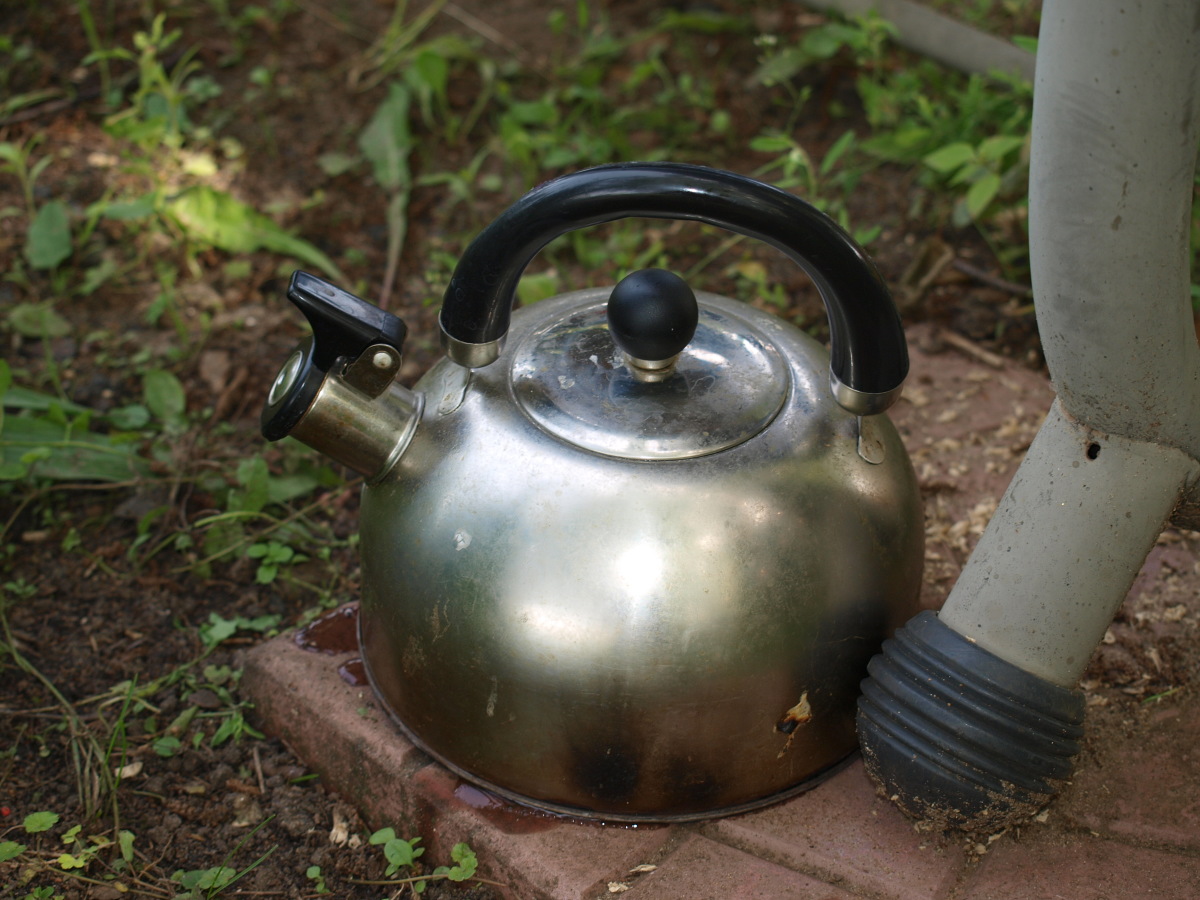
Ants like to make their nest under boulders, under garden tiles, or on soft ground. In this case, try moving the soil or, if necessary, lifting the garden tiles: if you are taken over by ants, you will most likely find their nest here. Ant eggs are white and oval, several millimeters long.
But not only that: they often settle by digging small tunnels in the cement of old walls: it might be useful to cover all these holes and cracks with a new layer of concrete. And if none of these remedies work, you just need to try specific products that you can buy at the supermarket. In this case, be sure to be very careful if you have pets or small children at home because these products can be very toxic!
It is worth mentioning separately about ancient folk methods of fighting.
The oldest excellent remedy that has survived to this day is sheepskin. It is cut into strips, which are moistened with carbolic acid, and raspberries are wrapped with them somewhere at a height of 15 cm from the surface of the earth. Moreover, the strips must be turned with the wool outward.
There are several natural ant repellents that are beneficial in the ecosystem but quite annoying if they are present in the home. Some of the most popular ingredients in ant control include baking soda, but what other eco-friendly solutions eliminate ants in the home and garden?
How to deal with black ants?
What are Natural Ant Remedies? How to remove them? There are peaceful ways to get rid of these unwanted guests, and this can be done while respecting the environment and other living things: Ants are insects that are beneficial to the ecosystem, but they can bother us when they invade our home on hot days and summer nights. How to control ants and keep them away from the kitchen, bathroom or the rest of the house? There are some products in the market, but they contain chemicals that are harmful to health and the environment.
How to remove ants from the garden using carbon sulphide? Make a furrow around the insect shelter, pour the product into it and set it on fire. But this is a radical method, since beneficial insects can also suffer along with harmful ones.
You can fill the pests' home with chopped garlic or onions. 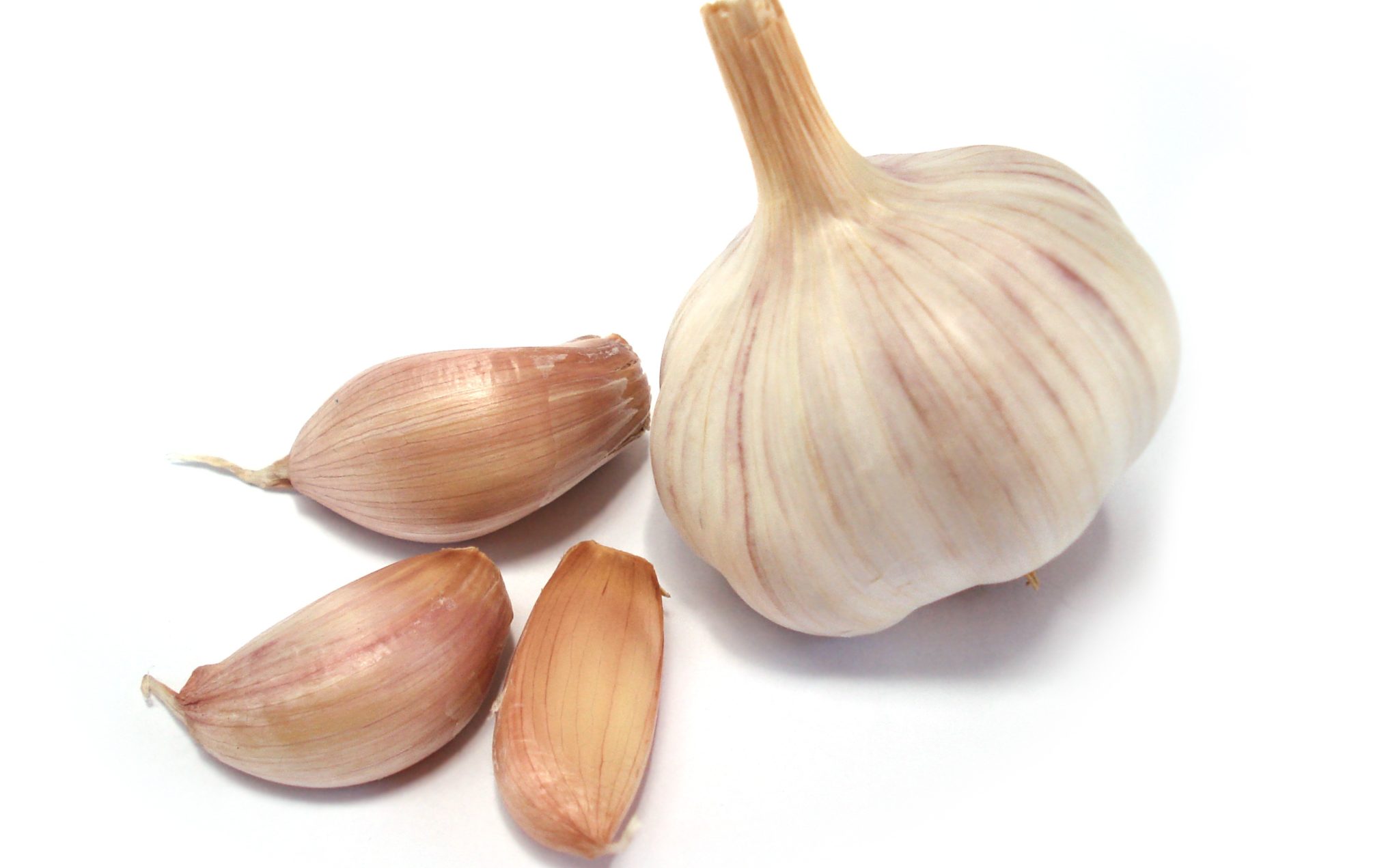
How to remove ants at home
Among the natural remedies against ants is baking soda, but many of them are those that need to be painted to remove ants in the house and garden. 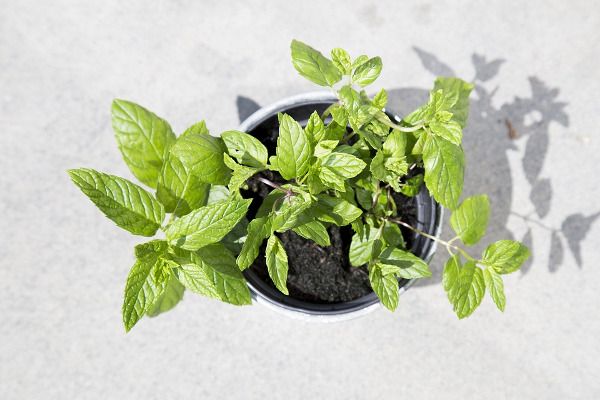
To keep these insects away from your home, you don't need to use a dangerous ant insecticide for your health and the environment, but you can use an environmental ally for indoors: They also include ants because the smell of this ingredient is particularly annoying to them. Create a solution of vinegar and water, also adding eucalyptus essential oil, using a spray container to pour the vinegar to spray in the direction of ant-infested corners and thresholds.
A folk remedy for ants in the garden, such as bait poison, helps. It is prepared from one third of a teaspoon of borax, 3 tablespoons of water and 1 tablespoon of sugar. All ingredients are combined, heated, and after cooling, add 1 teaspoon of honey.
Prepare sweet water from sugar, honey and water. If in the previous version the poison is laid out near the habitats, then here you need to pour it in a stream into the anthill using a groove. When the ants follow the sweet path, you will need to collect them - sprinkle them with salt, trample them, throw them into water. After a few days, the procedure is repeated, but a new groove will be required, installed in a different direction.
Water and vinegar should also be used to clean and disinfect floor and floor surfaces. Even though the vinegar dries quickly, the ants will have a pungent and unbearable odor. Chili can be used to eliminate the presence of ants in the home by simply keeping the clump in the pantry. Mint, bay leaves and coffee beans are also good for this purpose, because ants do not like these odors: it is enough to surround the access points that you have identified with these ingredients.
Among the natural anti-ant agents, there is also sodium bicarbonate: a mixture with sugar and baking soda, placing the mixture next to doors and windows and, if you consider it necessary, also inside kitchen furniture. You can then fight the ants with gypsum, boralco, cinnamon, cucumber and oregano. Even these ingredients, if placed near doors and windows, act as a natural barrier.
Insects do not like the smell of ash, as well as crushed bark and lime. They are often placed near pest locations.
You can put heads from smoked herring or the herring itself in crushed form into the home of uninvited guests. But this method often causes discomfort to the gardener himself.
It is permissible to remove goosebumps from the area by laying a layer of ash and soot on their home, sprinkling table salt on top.
How to remove ants in the garden

How to remove ants in the garden? To remove ants, salt and spices are effective means: Ants tend to leave when they smell themselves. Choose from a variety of spices, such as paprika and cloves, which can also be used as essential oil- and other similar aromas and spread around the affected areas.
How are ants useful in the garden?
Like vinegar, they also include ants: place a few slices of lemon, perhaps sprinkled with black pepper, on areas where ants pass, or use the fresh juice directly. Are you looking for more tips for dealing with ants? Denying strong odors, even pepper and eucalyptus will do a great job of repelling ants.
Sometimes chopped garlic or wormwood branches are placed on the paths along which insects move. 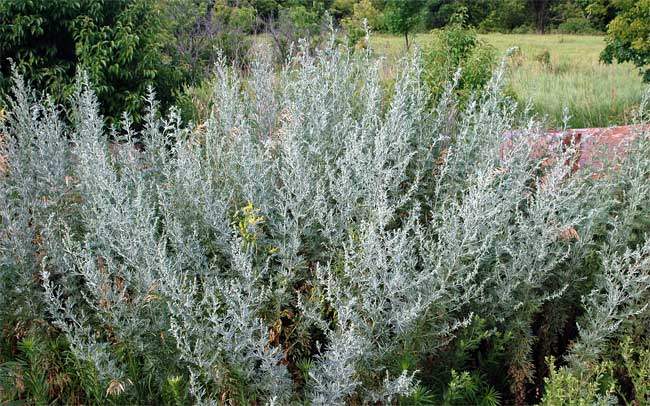
How to deal with uninvited guests using yeast? 1 tablespoon should be filled with cooled boiled water. The consistency of the mixture should be similar to thick sour cream. For sweetness, it is recommended to add a teaspoon of jam. The bait needs to be renewed from time to time, as it tends to dry out.
Traps are also set - a mixture of honey, sugar, borax and water is poured into a jar. To make it easier for insects to get into the jar, they put up a kind of ladder made of straws.
Ants on fruit trees and bushes
Insect control must be carried out not only in the garden, but also on berry bushes and fruit trees. There is no need to use any insecticide to protect crops. The natural sheepskin we have already mentioned above is suitable. It is cut into strips and wrapped around shrubs and trees with the wool facing outward at a height of 15–20 cm from the ground. Don’t forget to apply carbolic acid to the fur for added effect. It repels goosebumps with its pungent smell.
Insects often attack berry beds, resulting in crop loss and plant death. The method of control is chosen taking into account the stage of crop development. If the bushes are still blooming, it is recommended to place containers with a yeast-based mixture. If they already have green fruits, spray them with a solution of ammonia based on water. It is first prepared from 1 tablespoon of alcohol diluted in 8 liters of liquid. After leaving for 30 minutes, the solution is used for treatment. This alcohol concentration will not harm plants.
Spraying cannot be carried out when the berries are already ripe. You can only scare away goosebumps with the help of branches of mint, wormwood, tansy, which are placed between the bushes. From time to time the old ones are removed and replaced with fresh ones. Leave radical methods until the entire harvest has been harvested.
Video “How to drive ants out of trees and bushes”
In this video you will see how to get rid of ants that live on trees and shrubs.
In everyday life, people’s attitude towards ants is the most positive: they lead a curious lifestyle, reminiscent of a human one, actively destroy pests and, in general, are friendly neighbors with humans. However, experienced summer residents, having noticed an anthill on their site, keep a vigilant eye on it - they know that an excessive number of insects is unsafe for plantings and harvests. In what cases do little friends become enemies, and how to get rid of ants in your garden beds if you find them in your garden?
The appearance of ants in garden beds is natural
Types of ants in garden beds
New species of ants are regularly added to the already studied species, and today there are more than 14,000 species of these insects in the world. Of these, in Russia and neighboring countries belonging to middle lane Eurasia, there are about 300 inhabitants. A novice gardener or gardener does not need to understand in detail the classification of the entire ant family, since the most common are only three types of ants in garden beds:
- yellow - small (up to 4–5 mm) individuals with a reddish-red body have the scientific name Myrmica rubra and feed mainly on aphid honeydew;
- two-colored - these ants are called red forest ants, they are larger (7–14 mm), distinguished by a reddish-red hue of the chest and black head and abdomen;
- black - they are also called lasius, and they are the most famous garden ants, which every Russian summer resident encounters everywhere.
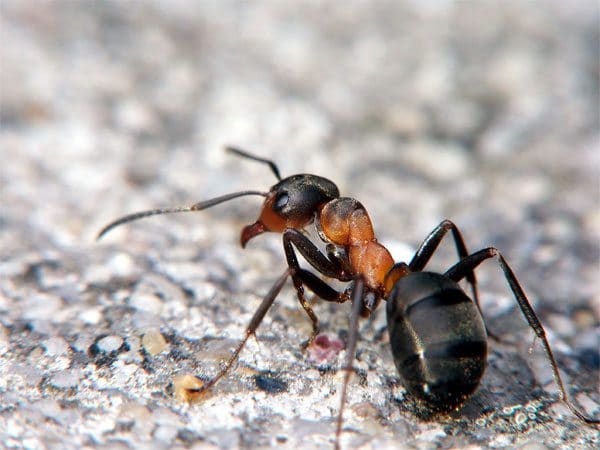
Forest ants are included in the International Red Book
If forest ants are considered welcome guests in garden beds, helping to protect plants from pests, then red and black ants in gardens are a frequent and often unpleasant phenomenon. Their anthills spoil appearance area, especially where lawns and flower beds are located. However, you should not fight them immediately as soon as they are noticed: insects can bring quite tangible benefits to your plantings.
The benefits and harms of an anthill on the site
Questions often appear on the Internet from confused gardeners: are ants needed in the beds or do they need to be dealt with like weeds? Even the most eminent experts give the exact opposite answers, so you will have to solve this problem yourself, comparing the pros and cons of such a neighborhood specifically for your case.
What are the benefits of garden ants?
One can rejoice at the appearance of ants in the beds simply because this fact is evidence of soil fertility. Hardworking underground inhabitants prefer to settle on well-warmed, healthy soil, saturated with air and nutrients. If, on the contrary, you notice that the ants have disappeared from the site for an unknown reason, it is important to analyze what could have happened and whether it is permissible to plant fruit crops in this place.

The ants defeated the caterpillar
Thanks to the activity of ants, many gardening chores are greatly facilitated:
- fight against insect pests, their larvae and caterpillars - it is estimated that the inhabitants of one average anthill, being active and omnivorous predators, are capable of destroying up to 5 million different species over the summer garden pests, and in this respect ants are even more effective than birds;
- aeration of the fertile soil layer - anthills are an impressive system of numerous underground passages and chambers, breaking through which little workaholics provide natural ventilation and saturation of the soil with oxygen;
- increased fertility - at the location of the ant “city” there is an increased accumulation and decomposition of organic residues, and therefore the plants living here develop more actively;
- sanitary cleaning of beds - busily collecting twigs, pine needles, wood and grass particles from the adjacent territory, ants imperceptibly but confidently clear it of debris and contribute to its rapid decomposition.

Attack on plants
In some countries, they manage to use ant labor to harvest valuable seeds, and their eggs and larvae are eaten and used to make medicine.
Dangers of ant infestation
As you can see, a moderate number of ants is not a hindrance to maintaining a garden and vegetable beds. But in favorable conditions their communities multiply to colossal proportions. This is not surprising - a female ant is capable of laying at least 20 eggs per day, and she lives 20–25 years. Worker ants are also considered to be the longest-lived insects in the insect world, with an average age of 2–3 years.

Ants carry aphids from place to place
But the greatest crime of ants against gardeners is their ability to manage the house. Ant colonies have several “own” herds of aphids, whose honeydew (sweet milk) they prefer to feed on. Ants look after aphids, carry them to rich pastures and even protect them from natural enemies. As a result, pests multiply on a cosmic scale, simultaneously destroying crops and plantings.
How to get rid of ants - working methods
Instead of hastily declaring war on insects, it is better to first observe their behavior. If the activity of ants does not affect your beds in any way, do not harass them - try to periodically monitor the size of the nest and observe the places of maximum accumulation so as not to delay the appearance of aphids. But as soon as the anthill began to grow, or clusters of aphids appeared, it was time to choose a way to combat both the “shepherds” and the “sheep.”
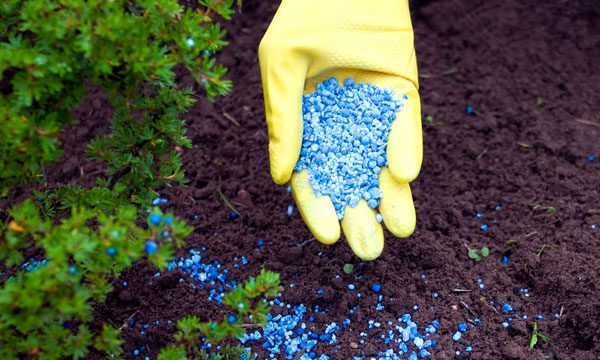
Don't rush to resort to chemicals
Expulsion and destruction by folk remedies
One of the most favorite folk remedies from ants in the beds there are aromatic attacks.
- Firstly, they are harmless to insects, since they do not kill them, but only force them to change their place of residence.
- Secondly, this method is environmentally friendly and quite effective: the effect is explained by the fact that ants, which communicate with each other using the sense of smell, lose contact with each other when a strong aroma appears and prefer to go home.
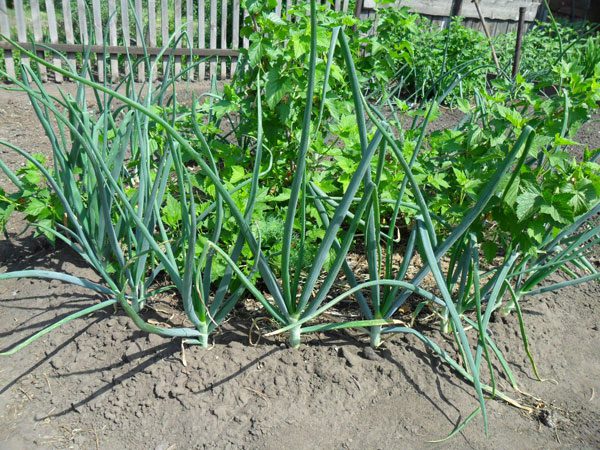
Plant onions or garlic along the edges of the beds
Finally, such aromatherapy of a site is cheap - ordinary herbs serve as medicine:
- wormwood, tansy, laurel, mustard, anise, onion, garlic - sharp-smelling fresh stems can be scattered near an anthill or tied to tree trunks or bushes;
- valerian, marigolds, mint - by planting them on your plot, you will immediately get rid of the problem of how to remove ants from the garden bed and get your own herbal pharmacy;
- hot pepper, tobacco, onion peel – it is recommended to regularly spray protected plants with infusions of them.

Ants also don’t like the smell of valerian
In addition to herbal preparations, it is also possible to use improvised means - wood ash, soda, tobacco dust, ground red and black pepper, lime, as well as mixtures of them.
Vegetable oil and shampoo is an environmentally friendly method. To prepare the product, mix: 10 liters of ordinary water, 0.5 liters of vinegar, 0.5 liters vegetable oil and 0.5 liters of cheap shampoo. The nest needs to be pierced so that the mixture penetrates deeper, and the composition should be poured onto the anthill.
It is likely that you will have to go through several options or create a complex until you can determine how to completely drive the ants out of the garden.
Sometimes the implementation of some traditional methods doubtful. For example, regularly watering an anthill with old urine will most likely help get rid of insects, but it is unlikely to be comfortable for the summer residents themselves. Or laying a smoked herring head on top of the nest: it should not be of the first freshness, which means that the appropriate smell is ensured, and besides, if the area is open, a pack of stray dogs or cats can run to it.
Hunting with bait and traps
If an ant colony is growing rapidly, it is recommended to set traps weekly to control its growth. The principle of their operation is simple: by luring insects with something tasty - sugar, honey, pieces of fruit, meat bones diluted in water - they can be easily destroyed with boiling water or fire.
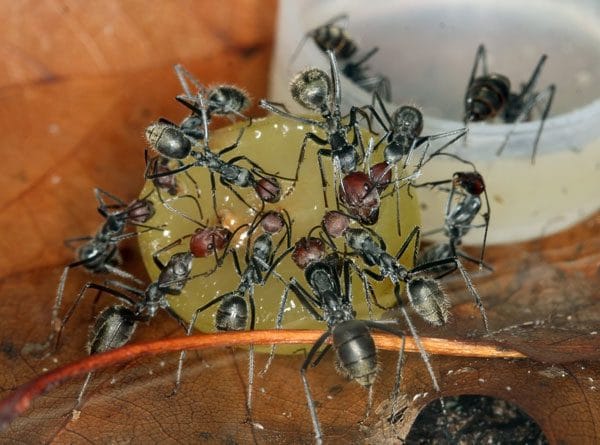
Ants eat poison
Headache, what to do with caught ants, remove poisonous baits containing substances that are lethal to them. They are prepared at home according to one of the following recipes:
- in 6 tbsp. l. hot water dissolve 3 tbsp. l. sugar, 1 tsp. boric acid and 3 tsp. honey - pour the resulting liquid into old plastic lids and place them in places where insects accumulate;
- 4 tbsp. l. minced meat mixed with 0.5 tsp. Borax - “treat” rolled into balls and scattered near the anthill and on the paths;
- 3 tbsp. l. dry yeast diluted with 3 tsp. jam and cold water until the consistency of sour cream - apply the mixture onto pieces of thick cardboard and leave them in the desired areas;
- Pour half a pack of salt into a bucket of water and stir - pour the saline solution generously over the anthill and surrounding area.

Sticky belt on a tree trunk
Sticky traps placed on bushes and trees help protect them not only from the ants themselves, but also from the aphids they carry. For production, use rags oiled with old oil, paper coated with permanent adhesive or double-sided tape. True, such traps are effective only on young trees with smooth bark. Otherwise, the ants will still find loopholes.
Destruction of insects with drugs
Another way to solve the problem of how to remove ants from garden beds is chemical treatment. To do this, there are many means, the action of which is aimed at the total destruction of adult individuals and their larvae:
- gel “Great Warrior” (clopyrifos and diazinon) - the product does not begin to act immediately, but after a certain period, when the insect manages to return to the nest and infect others, including the uterus;
- Muracid liquid (diazinon) is a fairly economical drug (1 ml is enough for 15–20 anthills), the effect of which lasts for 2–3 months;
- Phenaxin powder (fenvalerate and boric acid) – intended for spraying along ant trails, around plants and directly near nests, the procedure must be repeated daily until the pests completely disappear;
- granules or concentrate "Aktara" (thiamethoxam) - a universal insecticide, effective for soil application or spraying of plants;
- “Anteater” is a chemical liquid product in ampoules. To prepare the solution, an ampoule of concentrate is diluted with 10 liters of water;
- German Delicia powder can be used dry or as a solution (10 g of powder per 5 liters of water). The powder is scattered along the routes of insects.

Self-spraying disinfectant spray
Important recommendations and preventive measures
Before treating the bed from ants, it is recommended to familiarize yourself with the hygienic standards for the content of pesticides in environmental objects GN 1.2.2701-10 and the State Catalog of Pesticides and Agrochemicals Permitted for Use in the Russian Federation.
Before using the product, carefully read the instructions and strictly follow its instructions. Unauthorized changes in the concentration of the solution and the conditions for treating areas are fraught with the emergence of resistance (resistance) of ants to the drug, and it will be more difficult to cope with them. Remember that the drugs described above are harmful not only to insect pests, but also to bees, livestock, birds, and pets.
To prevent the appearance of anthills on the site, it needs to be made less attractive to insects:
- prevent the appearance of aphids - spray trees and shrubs until buds form;
- destroy detected aphids immediately;
- dig up the soil, especially in places where there is a suspicion of an anthill;
- keep clean - bread crumbs and leftover food attract insects.

Professional site remediation
If the ants in the garden bed are not very susceptible to the measures being taken, but cause significant damage not only to plantings, but also to buildings, contact professional pest control experts. They must identify and destroy all foci of infection with drugs that are safe for humans and their pets, and guarantee a pronounced effect on the entire summer season and provide advice on prevention methods.